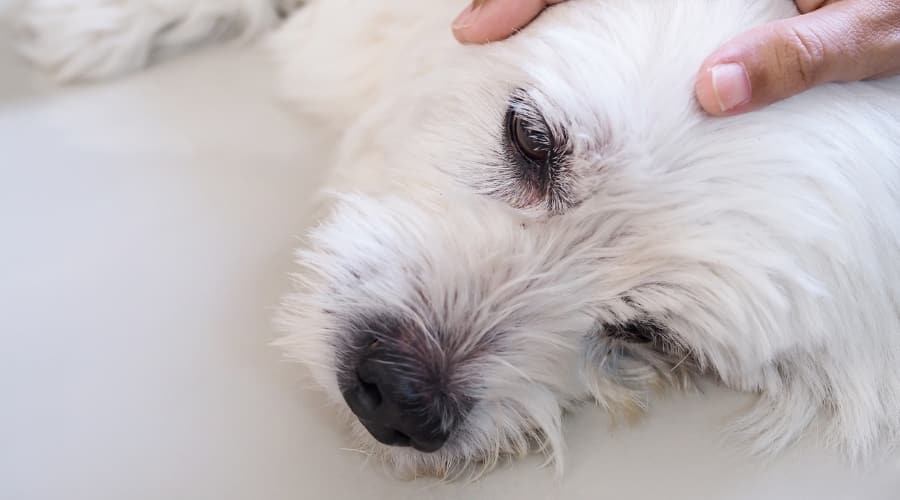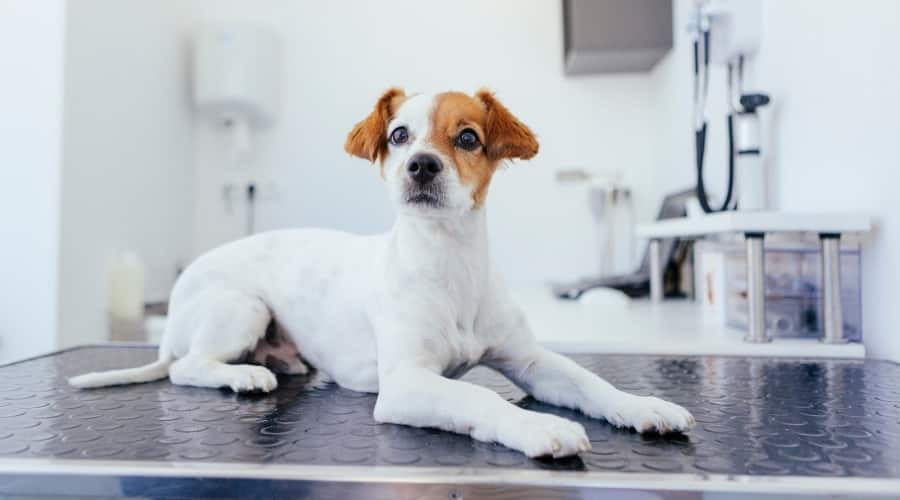When you purchase through links on our site, we may earn a commission. Here’s how it works.
If your once-normal pup is suddenly shaking and shivering, you are likely scratching your head for any possible cause. Or, perhaps you’ve recently adopted a pup, and they just naturally shake and shiver all the time, causing you to be concerned.
Shaking can be a normal part of some dogs’ nature. It’s actually quite common amongst some breeds, more than others. But, it can also point to developing illness in many furry friends. So what could cause your dog to shake or shiver?
This article will dive into the details of shaking in dogs. You’ll learn about why dogs do it, which breeds are more prone to it, and also help you understand when you should be concerned for your canine companion.
Table of Contents
Is This Normal Behavior In Dogs?

If your pup is suddenly quivering, you may wonder, “Is this normal?” While some dogs shiver daily, this can be abnormal for some furry friends. The cause of shaking in our canine companions can range from something benign to a serious medical concern. So how do you know?
The best way to gauge how concerned you should be is by simply knowing your dog and being aware of its typical habits. If your nervous pup quivers each time they get worked up, you can come to the conclusion that this is regular behavior for them. However, if your pup suddenly shakes for the first time, this should certainly raise an alarm.
Knowing your dog’s normal habits and behaviors can help you determine your next action and whether or not this warrants an immediate trip to the vet.
Why Is My Dog Shaking Or Shivering?
There are many reasons why a dog could be shaking or shivering. To help you get to the bottom of this behavior in your pup, let’s get into some of the potential factors below.
They Are Cold

Like you and me, our dogs will begin to shiver when they are cold. Shivering is a way to generate body heat, resulting in a full-body quivering when a dog is in a cold climate. Dogs of different types will be affected by the cold in different ways.
For example, a burly Labrador Retriever can tolerate cold weather much more than a small Chihuahua, meaning the exact temperature range that causes shivering can vary. To be safe, it’s best to monitor your pets closely in any temperatures less than 50 degrees.
They Are Anxious

Have you ever seen anyone bite their nails when they are nervous? Well, our dogs also display standard behaviors when they are anxious. Some dogs will shake and quiver each time they are overcome with nerves. This is most common in dogs with some form of anxiety and in dogs currently experiencing a stressful event.
For example, some dogs begin to whine and shake every time they step into the car. This can be due to thinking they are likely heading to the vet, causing them to become extremely anxious. If your pup suddenly shakes during a potentially stressful event, this is likely due to canine anxiety.
They Are Excited

Sometimes our dogs become so excited that they practically bubble over with happiness. An excited pup may not know how to contain themselves, leading to full-body trembling and wiggling.
This is common canine behavior when owners first come home when they interact with other dogs or participate in other activities that bring them joy. If your pup is shaking when they are overwhelmed with happiness, this is typically nothing to be concerned about.
They Are In Pain

Shaking is a common sign of pain in our canine companions. Body tremors or muscle tremors can be your dog’s way of telling you they are uncomfortable, ranging from chronic illness pain to sudden injuries. Not only do dogs shiver when they are in pain, but they also tend to display other changes in behavior.
A dog in pain may shake, appear tense, act lethargic, shy away from their food, or even cry out when touched. If you think their shaking or shivering is due to pain, it’s time to contact your veterinarian.
They Have Joint & Muscle Weakness

Have you ever had such an intense workout that it leaves your legs shaking? This can also happen to our furry friends, whether it’s a result of an intense workout or generalized weakness. Dogs with joint disease or muscle weakness may shake and tremble as they participate in physical activity.
This is most common in senior dogs, as they are prone to muscle loss over the years. If your dog with muscle weakness is trembling each time they are active, it may be time to speak with your vet about strength training for your pup.
They Have A Generalized Tremor Syndrome

Trembling is a normal part of some dogs’ lives. Small breed dogs are more likely to have a condition known as Generalized Tremor Syndrome, causing a dog to shake and fidget for unknown reasons. You may have seen this condition in breeds such as chihuahuas, who tend to be the poster child for this syndrome.
The tremors in this condition could be tied to difficulties regulating body temperature, canine anxiety, or even underlying neurological conditions. The exact cause of this syndrome is still unknown but can usually be managed with the addition of corticosteroids.
They Have a Neurological Disorder

Sometimes shaking or shivering in our beloved pups can signify something more. Dogs can develop neurological conditions, just like humans, with canine epilepsy being the most common form. Full-body or localized tremors can be a form of seizure activity in dogs, often requiring medical attention to manage.
Dogs with canine epilepsy may experience shaking, twitching, disorientation, loss of consciousness, violent shaking, vocalization, appear to hallucinate, and more. If you think your pup may have a neurological disorder, it’s best to contact your vet for further advice.
They Are Experiencing Toxicity

Dogs are known to get their paws on things they shouldn’t. Whether this is human food they shouldn’t consume or household products, foreign foods, and substances can cause our dogs great harm.
While there are more symptoms of toxicities than just shaking and shivering, it is a potential symptom to be aware of. Other signs of toxicity in dogs include drooling, nausea, diarrhea, agitation, lethargy, skin irritation, and even seizures.
If you think your dog may be experiencing toxicity, it’s best to contact your vet for proper treatment. You can also contact the Pet Poison Helpline if you know what your dog ate or came in contact with, and they can offer you guidance on what to do next.
Other Medical Conditions

Multiple medical conditions can cause shaking and shivering in our canine friends. Whether it’s due to the discomfort the condition causes or other impacts on their overall health, tremors can be a sign of underlying medical conditions in some dogs.
If your once-normal pup is suddenly shaking, it’s always best to contact your veterinarian. Your veterinarian can gather a full history and perform multiple diagnostics to help get to the bottom of their sudden shaking.
When To See the Vet

So when should you seek veterinary care for your shaking pup? If your dog suddenly shakes without a known cause, it is always best to seek medical advice. Shaking can certainly be tied to canine anxiety or other forms of behavioral struggles, but it can also point to something more. If you cannot link their shaking to a specific event, it is always best to contact your veterinarian.
This is also highly suggested if your dog is experiencing any other behavioral changes or other symptoms that are not common in your canine friend. Be sure to scan your home for any potential cause of their sudden shaking, and offer your vet a full history of the days leading up to this change in behavior.
Final Thoughts
Shaking and shivering in dogs can be due to multiple causes. Most of the time, it’s not something to be immediately concerned about. But it’s still worth investigating, and if you are concerned, you should definitely contact your veterinarian to schedule an in-person visit and get their advice.



